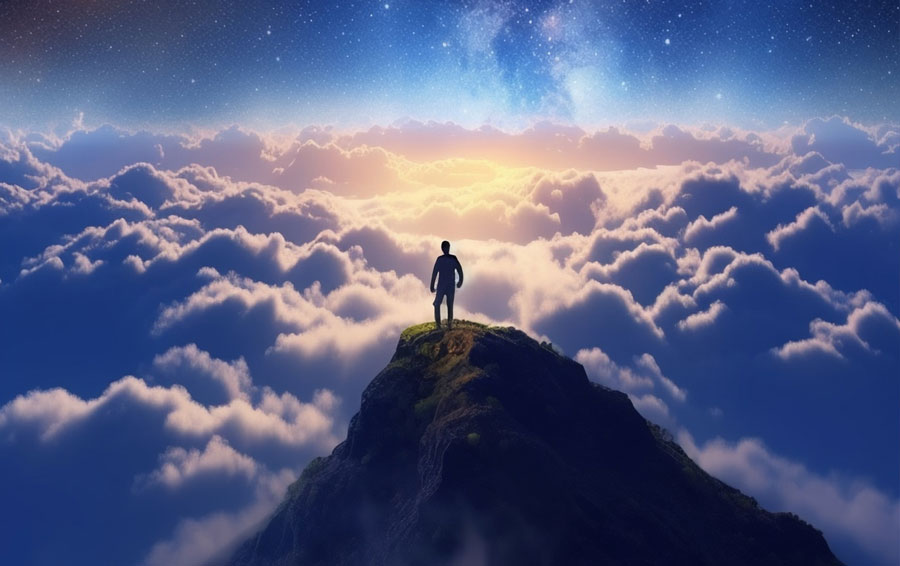
Introduction: In the vast tapestry of Hindu mythology and scriptures, the concept of the first human holds a significant place. The story of the first human in Hinduism not only explores the origins of humanity but also delves into profound philosophical and spiritual themes. In this blog post, we embark on a journey to uncover the identity and significance of the first human in Hinduism, shedding light on a timeless tale that continues to inspire seekers of truth and wisdom.
The Vedas, the ancient scriptures of Hinduism, mention Manu as the archetypal man or the first human being. He is described as the mind-born son of Brahma, the creator god, and husband of Shatarupa. According to some Puranas (Hindu mythological texts), Manu was born from a lotus flower that sprouted from the navel of Vishnu, the preserver god.
The concept of the first human in Hinduism is deeply intertwined with the rich tapestry of Hindu mythology and cosmology. While various texts and traditions offer different interpretations, one prominent figure often associated with the origin of humanity is Manu.
According to Hindu scriptures, Manu is often regarded as the progenitor of humanity, Manu The First Man. He is depicted as the first human being, created by the divine will of the gods to fulfill a sacred purpose on Earth.
The story of Manu is narrated in the ancient texts known as the Manusmriti and the Puranas. According to these texts, Manu was instructed by the god Brahma to embark on a journey to save humanity from a catastrophic deluge known as the Pralaya (Great Flood).
As the floodwaters engulfed the world, Manu, guided by the divine counsel of Brahma, built a massive boat or ark to save himself, his family, and representatives of all living beings. This act of preservation ensured the continuity of life on Earth.

Manu, the Savior: Weathering the Great Flood
Hindu mythology recounts a catastrophic flood that threatened to engulf the world. Forewarned by the Matsya avatar (fish incarnation) of Vishnu, Manu constructed a massive ark and saved himself, his family, and the seven sages (Saptarishis). After the flood subsided, Manu became the progenitor of humanity, repopulating the Earth
Following the flood, Manu is said to have received knowledge and laws directly from the divine. He is credited with establishing the social order, outlining duties and responsibilities for different classes. The Manusmriti, a legal and social treatise, is traditionally attributed to him, although the actual text is a compilation of works by various authors over a long period.
The story of Manu is often interpreted symbolically and allegorically, representing deeper philosophical and spiritual truths. Manu symbolizes the resilience of the human spirit, the cyclical nature of creation and destruction, and the eternal quest for self-realization.
The story of the first human in Hinduism, embodied by the figure of Manu, transcends time and space to illuminate the eternal truths of existence. As the progenitor of humanity, Manu embodies the resilience, wisdom, and divine purpose inherent in every individual. His story continues to inspire seekers on the path of self-discovery and spiritual realization, reminding us of our interconnectedness with the cosmos and our shared journey towards enlightenment.
Manu is primarily regarded as a mythological figure representing the archetype of humanity's progenitor in Hindu tradition. While his story may contain elements of historical allegory, it is primarily symbolic and metaphysical in nature.
Yes, various Hindu texts and Puranas contain different versions of the story of Manu, reflecting regional and sectarian variations in Hindu mythology.
Manu symbolizes the divine order (dharma) that governs the universe and the eternal cycle of creation, preservation, and dissolution. His story underscores the importance of righteousness, duty, and moral responsibility in Hindu thought.
The story of Manu shares similarities with flood myths found in various cultures worldwide, highlighting universal themes of cataclysmic destruction, divine intervention, and the preservation of life.
Yes, consulting Hindu scriptures or an experienced astrologer can provide insights into one's spiritual journey and karmic connections, including any parallels or resonances with the story of Manu.
For more Interesting topics follow us on Instagram
Author :